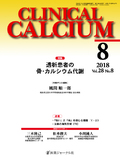Japanese
English
- 有料閲覧
- Abstract 文献概要
- 1ページ目 Look Inside
- 参考文献 Reference
ウレミックトキシンは慢性腎臓病(chronic kidney disease:CKD)の進行に伴い血中濃度が増加し,その血中濃度増加と尿毒症症状の発症・進展が関連する分子を総称するものである。ウレミックトキシンの標的臓器は多彩であり,骨もその一つであると考える。インドキシル硫酸,p-クレシル硫酸などの蛋白結合分子,副甲状腺ホルモン(parathyroid hormone:PTH),あるいはレニン-アンギオテンシン-アルドステロン系(renin-angiotensin-aldosterone system:RAAS)などが骨脆弱性に関連する可能性が基礎および臨床研究から明らかにされつつある。中でもウレミックトキシンによる骨のPTHに対する抵抗性・骨質への影響やRAASの骨への影響は大きく骨・ミネラル代謝異常と並び注目するべき病態と考える。
Uremic toxins are increased with deterioration of kidney function and the levels are associated with progression of uremic syndrome. Uremic toxins are associated with various chronic kidney disease(CKD)-related systemic disease, and bone is one of major targets. Recent clinical and basic studies show that protein-bound uremic toxins, such as indoxyl sulfate(IS)and p-crecyl sulfate(PCS), parathyroid hormone, and renin-angiotensin-aldosterone system(RAAS)are associated with bone fragilities. IS and PCS induce skeletal resistance to PTH in osteoblasts and osteoclasts as well as impairment of bone quality. Inhibition of the reaction of uremic toxins with bone is important therapeutic strategies for CKD-related bone fragilities in addition to treatment for CKD-mineral and bone disorder, and osteoporosis.



